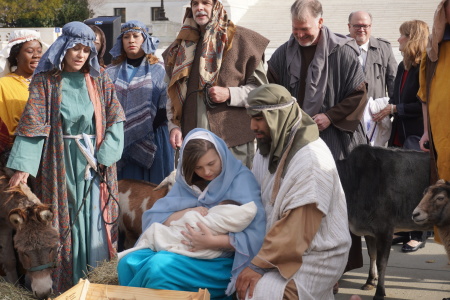Liberty Counsel launches annual ‘Friend or Foe’ campaign early to thwart Christmas censorship

A conservative law firm has announced the launch of its annual campaign aimed at protecting Christmas displays on both public and private property.
The Liberty Counsel announced Monday that it has launched the 22nd annual “Friend or Foe Christmas Campaign” to help spread awareness of the rights people have to openly celebrate the birth of Jesus.
Liberty Counsel founder and Chairman Mat Staver told The Christian Post that the annual campaign was launched in 2003 in response to “continuing lawsuits and demand letters and threats from organizations regarding Nativity scenes, religious symbols, even red and green that students might wear in public schools.”
“We wanted to push back,” Staver said. “We called it the 'Friend or Foe Christmas Campaign.' We wanted to find out who's the friend and who's the foe of Christmas.”
According to Staver, their campaign encountered situations like public schools censoring Christmas concerts and songs, Nativity scenes being banned, students being prohibited from handing out Christmas cards, and even some instances of displays that had red and green coloring being barred.
While the campaign initially focused on public schools, it later expanded to include responding to alleged censorship of Christmas displays in nursing and assisted living facilities, and then from there, dealing with private sector censorship via their “Naughty and Nice list.”
“The retail market began to censor Christmas so that Christmas tree was a 'holiday tree,’” Staver told CP. “'Holiday lights,' 'holiday wreath,' 'holiday tree,' no mention of Christmas. There was mention of Hannukah and Kwanzaa, but not Christmas.”
“We launched the 'Naughty and Nice List' that's part of our 'Friend or Foe Christmas campaign.' And that created a list of those that we said were censoring Christmas while they're profiting from it, and those that were acknowledging Christmas. When we first started, the naughty list was much longer than the nice list, but that quickly changed.”
Although centered on Christmas, Staver explained that his organization launched the campaign this week “because we wanted to be preemptive” on any possible censoring of Christmas.
"And the reason why we want to be preemptive is a lot of these decisions are happening now, like for example schools, end of year concerts, events, plays, performances and then also nativity scenes within public property and so forth,” he added.
Overall, Staver believes that “since we began the ‘Friend or Foe Christmas’ campaign and the ‘Naughty or Nice’ campaign, the efforts to censor Christmas have significantly decreased.”
Staver attributed the decline in complaints to the United States Supreme Court recently moving away from using The Lemon Test for their church and state decisions. The 1971 Supreme Court decision Lemon v. Kurtzman had ruled that the government can allow religious entanglement provided that it serves a secular purpose, does not inhibit or advance religion and does not result in an excessive entanglement of church and state.
However, in decisions like the 2022 Kennedy v. Bremerton School District, in which the court ruled 6-3 that a public high school football coach could pray on the field after games, the three-pronged legal test has been rejected.
“In place of Lemon and the endorsement test, this Court has instructed that the Establishment Clause must be interpreted by ‘reference to historical practices and understandings,’” wrote Supreme Court Justice Neil Gorsuch for the majority.
“Here, a government entity sought to punish an individual for engaging in a personal religious observance, based on a mistaken view that it has a duty to suppress religious observances even as it allows comparable secular speech. The Constitution neither mandates nor tolerates that kind of discrimination.”
Staver described the rejection of The Lemon Test as “a game-changer” for any Christmas display litigation, adding that it “gives us a lot more freedom."






















